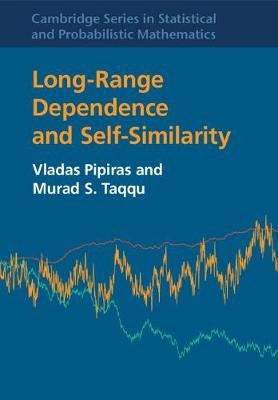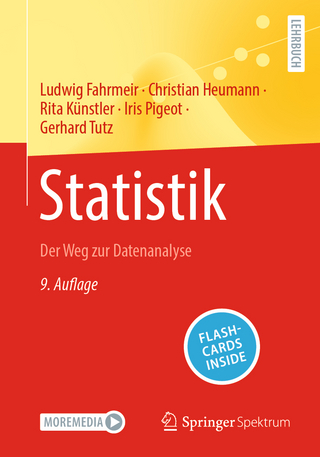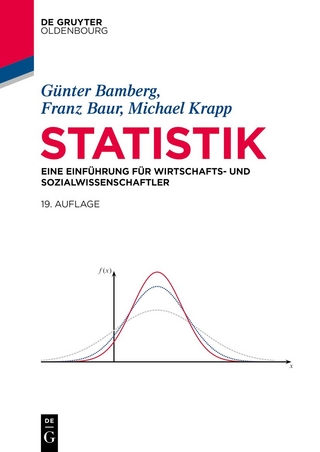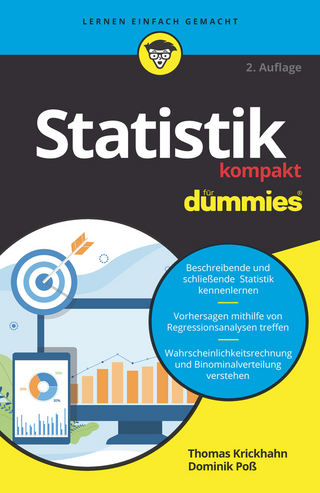
Long-Range Dependence and Self-Similarity
Cambridge University Press (Verlag)
978-1-107-03946-9 (ISBN)
This modern and comprehensive guide to long-range dependence and self-similarity starts with rigorous coverage of the basics, then moves on to cover more specialized, up-to-date topics central to current research. These topics concern, but are not limited to, physical models that give rise to long-range dependence and self-similarity; central and non-central limit theorems for long-range dependent series, and the limiting Hermite processes; fractional Brownian motion and its stochastic calculus; several celebrated decompositions of fractional Brownian motion; multidimensional models for long-range dependence and self-similarity; and maximum likelihood estimation methods for long-range dependent time series. Designed for graduate students and researchers, each chapter of the book is supplemented by numerous exercises, some designed to test the reader's understanding, while others invite the reader to consider some of the open research problems in the field today.
Vladas Pipiras is Professor of Statistics and Operations Research at the University of North Carolina, Chapel Hill. His research focuses on stochastic processes exhibiting long-range dependence, self-similarity, and other scaling phenomena, as well as on stable, extreme-value and other distributions possessing heavy tails. His other current interests include high-dimensional time series, sampling issues for 'big data', and stochastic dynamical systems, with applications in econometrics, neuroscience, engineering, computer science, and other areas. He has written over fifty research papers and is coauthor of A Basic Course in Measure and Probability: Theory for Applications (with Ross Leadbetter and Stamatis Cambanis, Cambridge, 2014) Murad S. Taqqu's research involves self-similar processes, their connection to time series with long-range dependence, the development of statistical tests, and the study of non-Gaussian processes whose marginal distributions have heavy tails. He has written more than 250 scientific papers and is coauthor of Stable Non-Gaussian Random Processes (with Gennady Samorodnitsky, 1994). Professor Taqqu is a Fellow of the Institute of Mathematical Statistics and has been elected Member of the International Statistical Institute. He has received a number of awards, including a John Simon Guggenheim Fellowship, the 1995 William J. Bennett Award, the 1996 Institute of Electrical and Electronics Engineers W. R. G. Baker Prize, the 2002 EURASIP Best Paper in Signal Processing Award, and the 2006 Association for Computing Machinery Special Interest Group on Data Communications (ACM SIGCOMM) Test of Time Award.
List of abbreviations; Notation; Preface; 1. A brief overview of times series and stochastic processes; 2. Basics of long-range dependence and self-similarity; 3. Physical models for long-range dependence and self-similarity; 4. Hermite processes; 5. Non-central and central limit theorems; 6. Fractional calculus and integration of deterministic functions with respect to FBM; 7. Stochastic integration with respect to fractional Brownian motion; 8. Series representations of fractional Brownian motion; 9. Multidimensional models; 10. Maximum likelihood estimation methods; Appendix A. Auxiliary notions and results; Appendix B. Integrals with respect to random measures; Appendix C. Basics of Malliavin calculus; Appendix D. Other notes and topics; Bibliography; Index.
| Erscheinungsdatum | 23.04.2017 |
|---|---|
| Reihe/Serie | Cambridge Series in Statistical and Probabilistic Mathematics |
| Zusatzinfo | 8 Tables, black and white; 58 Line drawings, black and white |
| Verlagsort | Cambridge |
| Sprache | englisch |
| Maße | 182 x 260 mm |
| Gewicht | 1420 g |
| Themenwelt | Mathematik / Informatik ► Mathematik ► Statistik |
| Mathematik / Informatik ► Mathematik ► Wahrscheinlichkeit / Kombinatorik | |
| Wirtschaft ► Volkswirtschaftslehre ► Ökonometrie | |
| ISBN-10 | 1-107-03946-0 / 1107039460 |
| ISBN-13 | 978-1-107-03946-9 / 9781107039469 |
| Zustand | Neuware |
| Informationen gemäß Produktsicherheitsverordnung (GPSR) | |
| Haben Sie eine Frage zum Produkt? |
aus dem Bereich


